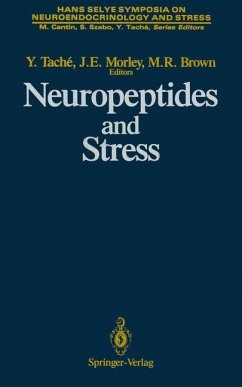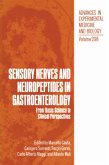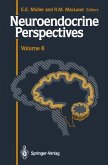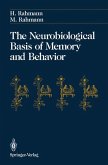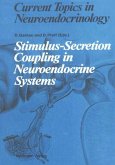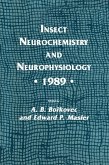Neuropeptides and Stress
Proceedings of the First Hans Selye Symposium, Held in Montreal in October 1986
Herausgegeben von Tache, Yvette; Morley, John E.; Brown, Marvin R.
Neuropeptides and Stress
Proceedings of the First Hans Selye Symposium, Held in Montreal in October 1986
Herausgegeben von Tache, Yvette; Morley, John E.; Brown, Marvin R.
- Broschiertes Buch
- Merkliste
- Auf die Merkliste
- Bewerten Bewerten
- Teilen
- Produkt teilen
- Produkterinnerung
- Produkterinnerung
Neuropeptides and Stress presents a comprehensive survey by leading pioneers in the field of the knowledge and concepts implicating neuropeptides in the regulations of responses to stress. Topics covered include: recent advances on the regulation and modulation of the behavioral, endocrine, autonomic, gastrointestinal, immune and analgesic responses to stress by neuropeptides. Neuroanatomical and biological data are considered. Special emphasis is given to corticotropin-releasing factor (CRF) and opioid peptides.
Andere Kunden interessierten sich auch für
![Sensory Nerves and Neuropeptides in Gastroenterology Sensory Nerves and Neuropeptides in Gastroenterology]() Marcello Costa / Calgero Surrenti / Sergio Gorini / Carlo Alberto Maggi / Alberto Meli (Hgg.)Sensory Nerves and Neuropeptides in Gastroenterology161,99 €
Marcello Costa / Calgero Surrenti / Sergio Gorini / Carlo Alberto Maggi / Alberto Meli (Hgg.)Sensory Nerves and Neuropeptides in Gastroenterology161,99 €![Neuroendocrine Perspectives Neuroendocrine Perspectives]() Neuroendocrine Perspectives81,99 €
Neuroendocrine Perspectives81,99 €![The Brain as an Endocrine Organ The Brain as an Endocrine Organ]() The Brain as an Endocrine Organ41,99 €
The Brain as an Endocrine Organ41,99 €![The Neurobiological Basis of Memory and Behavior The Neurobiological Basis of Memory and Behavior]() Hinrich RahmannThe Neurobiological Basis of Memory and Behavior77,99 €
Hinrich RahmannThe Neurobiological Basis of Memory and Behavior77,99 €![Stimulus-Secretion Coupling in Neuroendocrine Systems Stimulus-Secretion Coupling in Neuroendocrine Systems]() Stimulus-Secretion Coupling in Neuroendocrine Systems81,99 €
Stimulus-Secretion Coupling in Neuroendocrine Systems81,99 €![Insect Neurochemistry and Neurophysiology · 1989 · Insect Neurochemistry and Neurophysiology · 1989 ·]() A. B. BorkovecInsect Neurochemistry and Neurophysiology · 1989 ·161,99 €
A. B. BorkovecInsect Neurochemistry and Neurophysiology · 1989 ·161,99 €![Central Regulation of the Endocrine System Central Regulation of the Endocrine System]() Central Regulation of the Endocrine System43,99 €
Central Regulation of the Endocrine System43,99 €-
Neuropeptides and Stress presents a comprehensive survey by leading pioneers in the field of the knowledge and concepts implicating neuropeptides in the regulations of responses to stress. Topics covered include: recent advances on the regulation and modulation of the behavioral, endocrine, autonomic, gastrointestinal, immune and analgesic responses to stress by neuropeptides. Neuroanatomical and biological data are considered. Special emphasis is given to corticotropin-releasing factor (CRF) and opioid peptides.
Hinweis: Dieser Artikel kann nur an eine deutsche Lieferadresse ausgeliefert werden.
Hinweis: Dieser Artikel kann nur an eine deutsche Lieferadresse ausgeliefert werden.
Produktdetails
- Produktdetails
- Hans Selye Symposia on Neuroendocrinology and Stress
- Verlag: Springer / Springer New York / Springer, Berlin
- Artikelnr. des Verlages: 978-1-4612-8135-1
- Softcover reprint of the original 1st ed. 1989
- Seitenzahl: 368
- Erscheinungstermin: 1. Juli 2012
- Englisch
- Abmessung: 235mm x 155mm x 20mm
- Gewicht: 557g
- ISBN-13: 9781461281351
- ISBN-10: 1461281350
- Artikelnr.: 36114959
- Herstellerkennzeichnung Die Herstellerinformationen sind derzeit nicht verfügbar.
- Hans Selye Symposia on Neuroendocrinology and Stress
- Verlag: Springer / Springer New York / Springer, Berlin
- Artikelnr. des Verlages: 978-1-4612-8135-1
- Softcover reprint of the original 1st ed. 1989
- Seitenzahl: 368
- Erscheinungstermin: 1. Juli 2012
- Englisch
- Abmessung: 235mm x 155mm x 20mm
- Gewicht: 557g
- ISBN-13: 9781461281351
- ISBN-10: 1461281350
- Artikelnr.: 36114959
- Herstellerkennzeichnung Die Herstellerinformationen sind derzeit nicht verfügbar.
Dr. John E. Morley, known internationally as a gerontological researcher, clinician, and educator, became the Director of the Division of Geriatric Medicine and the Dammert Professor of Gerontology. In addition to extensive personal scientific achievements, Dr. Morley has directed the clinical training programs in both endocrinology and geriatrics and supervised research activities ranging from basic biomedical investigation to epidemiology and health services research. He is the editor of the Journal of Gerontology: Medical Sciences, and recipient of the Ipsen Foundation of Longevity Award in 2001, the American Geriatrics Society's Lascher/Manning Award for Lifetime Achievement in Geriatrics in 2002, and the Gerontological Society of America's Freeman Award in 2004. He has developed a number of educational games and has a special interest in continuous quality improvement (CQI).
Neuroendocrine and Behavioral Response to Stress Corticotropin-Releasing Factor (CRF).- 1. Corticotropin-releasing factor receptors in the brain and pituitary: their role in the stress response.- 2. Role of endogenous corticotropin-releasing factor in modulating the pituitary response to stress.- 3. Modification of hypothalamic neurons by behavioral stress.- 4. Stress-related behavioral effects of corticotropin-releasing factor.- 5. Corticotropin-releasing factor, stress and arousal.- 6. Dual control of corticotropin secretion: isolation of corticotropin-inhibiting factor.- Brain Peptides, Stress, and Autonomic Function.- 7. Neuropeptides, the paraventricular nucleus, and the integration of hypothalamic neuroendocrine and autonomic function.- 8. Autonomic neuropeptide connections of the amygdala.- 9. Neuropeptide regulation of the autonomic nervous system.- 10. Neurophysiology of hypothalamic magnocellular neurosecretory neurons.- 11. Brain vasopressin and cardiovascular regulation in normotensive and hypertensive animals.- Neuropeptides, Stress, and Gastrointestinal Function.- 12. Role of brain peptides in the ulcerogenic response to stress.- 13. Neuropeptides and duodenal ulcer: the cysteamine story.- 14. Stress, opioids, and gastrointestinal transit.- 15. Stress and consummatory behavior.- 16. Characteristics of brain calcitonin receptors.- 17. Calcitonin and calcitonin gene-related peptide.- Stress, Neuropeptides, and Immune Function.- 18. Opioid peptides, stress, and immune function.- 19. Neuropeptide receptors are shared components of nervous and immune systems.- Opioids and Stress.- 20. Opioid receptors and their ligands.- 21. Opioids and stress: effects upon nociception, behavior, and autonomic function following electroconvulsive shock, circulatory shock, or central nervous system injury.- 22. Stress, analgesia, and neuropeptides.- 23. Distinctive functional properties of limbic system opioid peptides.- 24. Opioids and stress: the role of ACTH and epinephrine.
Neuroendocrine and Behavioral Response to Stress Corticotropin-Releasing Factor (CRF).- 1. Corticotropin-releasing factor receptors in the brain and pituitary: their role in the stress response.- 2. Role of endogenous corticotropin-releasing factor in modulating the pituitary response to stress.- 3. Modification of hypothalamic neurons by behavioral stress.- 4. Stress-related behavioral effects of corticotropin-releasing factor.- 5. Corticotropin-releasing factor, stress and arousal.- 6. Dual control of corticotropin secretion: isolation of corticotropin-inhibiting factor.- Brain Peptides, Stress, and Autonomic Function.- 7. Neuropeptides, the paraventricular nucleus, and the integration of hypothalamic neuroendocrine and autonomic function.- 8. Autonomic neuropeptide connections of the amygdala.- 9. Neuropeptide regulation of the autonomic nervous system.- 10. Neurophysiology of hypothalamic magnocellular neurosecretory neurons.- 11. Brain vasopressin and cardiovascular regulation in normotensive and hypertensive animals.- Neuropeptides, Stress, and Gastrointestinal Function.- 12. Role of brain peptides in the ulcerogenic response to stress.- 13. Neuropeptides and duodenal ulcer: the cysteamine story.- 14. Stress, opioids, and gastrointestinal transit.- 15. Stress and consummatory behavior.- 16. Characteristics of brain calcitonin receptors.- 17. Calcitonin and calcitonin gene-related peptide.- Stress, Neuropeptides, and Immune Function.- 18. Opioid peptides, stress, and immune function.- 19. Neuropeptide receptors are shared components of nervous and immune systems.- Opioids and Stress.- 20. Opioid receptors and their ligands.- 21. Opioids and stress: effects upon nociception, behavior, and autonomic function following electroconvulsive shock, circulatory shock, or central nervous system injury.- 22. Stress, analgesia, and neuropeptides.- 23. Distinctive functional properties of limbic system opioid peptides.- 24. Opioids and stress: the role of ACTH and epinephrine.

